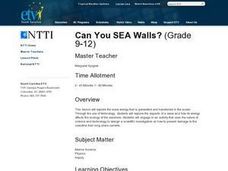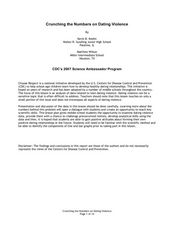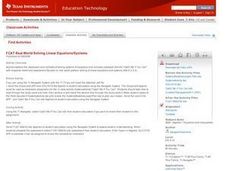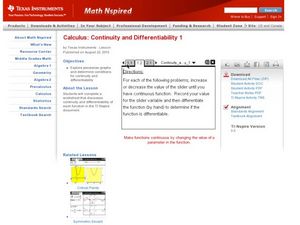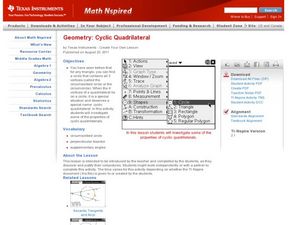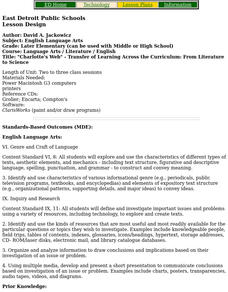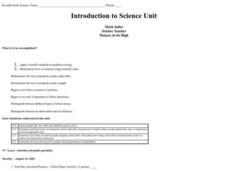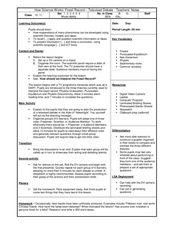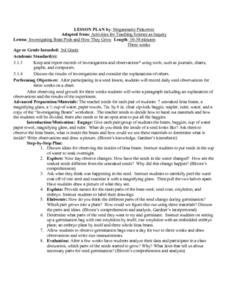Curated OER
What Plants Need in Order to Survive and Grow: Light
Students conduct an experiment to evaluate whether plants need light to survive and grow. They observe and gather data about plant responses to different growth regimes, analyze the data, and make conclusions about basic plant needs.
Curated OER
Can You SEA Walls?
Students explore how wave energy that is generated and transferred in the ocean. They explore the aspects of a wave and how its energy affects the ecology of the seashore. Students engage in an activity that uses the nature of science...
Curated OER
Size and Shape
Students observe different substances under the microscope. In this space science lesson, students identify the different features of SEM images. They formulate a conclusion about the images of Mars meteorites.
Curated OER
Comparing Data
Eighth graders create a survey, gather data and describe the data using measures of central tendency (mean, median and mode) and spread (range, quartiles, and interquartile range). Students use these measures to interpret, compare and...
Curated OER
Crunching the Numbers on Dating Violence
Students read about potential violent relationships and beliefs about dating. For this relationship lesson students use graphs to examine data about healthy realtionshipsand draw conclusions on their results.
Curated OER
Levers
Fifth graders participate in a review discussion of the parts of a lever, resistance or load, fulcrum, and effort. Next, they complete activities at six experiment stations while collecting data that they share with the class. While...
Curated OER
Ramp Builder
Students plan and build a ramp designed for maximum distance a car can travel. In this physics and data collection math lesson plan, students work in groups to design a ramp using various household materials. Students test small cars on...
Curated OER
More Power to You
Students explore renewable and nonrenewable energy sources and develop a documentary that explores multiple energy sources and draws conclusions about their uses.
Curated OER
FCAT Real World Solving Linear Equations/Systems
Pupils relate real life situation to the equations, graphs and inequalities. They model real life scenarios using matrices and draw conclusions from their data. This lesson plan is aligned with FCAT.
Texas Instruments
Continuity and Differentiability 1
Pupils examine graphs for continuity and differentiability in this calculus lesson plan. They observe piecewise functions to see where continuity and differentiability come into play. Learners finish by graphing their equation on the TI...
Curated OER
Cell Phone Range
Here is a 15 minute activity that can be used as review, a warm, or as a quick example of how to relate functions to the real world. Learners complete an application activity and draw conclusion about functions then discuss open and...
Curated OER
Creating a Cyclic Quadrilateral
Identify and make conjecture about properties of cyclic quadrilaterals. Students use the TI Navigator to create different shapes and draw conclusions.
Curated OER
Science Happens in a Social Context
Students discuss how the same data is viewed differently between historians and scientists. Using the data, they compare and contrast the vocabulary used and the focus of attention. They analyze the conditions that help spread diseases...
Curated OER
"Charlotte's Web" - Transfer of Learning Across the Curriculum: From Literature to Science
Learners research and write about the parts of a spider's body using educational software. They draw spiders using computer software.
Curated OER
Science and the Scientific Process
Students investigate the characteristics of different soil samples. In this physical science lesson plan, students play the role of forensics solving a crime by matching soil from the suspect's shoes. They formulate a conclusion after...
Curated OER
Standards And Science
Students study how standards are established in Science. They also look at the value of different perspectives with questions about ecological standards. The class creates its own standards for ecology with the help of a survey to obtain...
Curated OER
Responding to Alcohol: What's Important?
Learners examine the effects on motor functions in mice. They make observations and graph their data. They analyze the data and draw conclusions in each of the three experiments.
Curated OER
Introduction to Science
Seventh graders investigate scientific methods to solve problems. They demonstrate creating data tables and graphs. They study the role of a scientist and the importance of safety in a science lab. They distinguish between an...
Curated OER
How Science Works: Fossil Record - Televised Debate
Learners compare the three theories used tp interpret fossil records. In this earth science lesson, students create a production of a televised debate. They collaborate with group members to generate relevant questions about the topic.
EngageNY
Logarithms—How Many Digits Do You Need?
Forget your ID number? Your pupils learn to use logarithms to determine the number of digits or characters necessary to create individual ID numbers for all members of a group.
Curated OER
The Blue Bottle: An Example of Teacher-Guided Inquiry
Students observe a demonstration in which a bottle containing a colorless solution is mixed, turns blue, then becomes colorless again. They record observations, form and discuss hypotheses, and draw a conclusion based on the evidence.
Curated OER
Layers of the Earth
Eighth graders study the earth's surface. In this planet structure lesson students view a PowerPoint presentation then draw and label the earths layers.
Curated OER
How Much Salt is in the Gsl Water?
Fourth graders study the water cycle and the different processes that are involved, like precipitation, evaporation, etc. They conduct an experiment observing the water cycle in action and write a hypothesis, observations and...
Curated OER
Investigating Bean Pods and How They Grow
Third graders observe and create a record of seed growth over time. After planting a seed, 3rd graders record their observations of the seed's growth over a three week period. Upon conclusion of the experiment, they write a paragraph...



